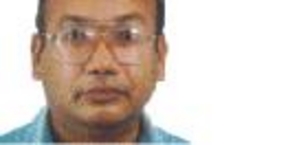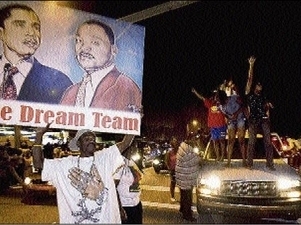
Barack Obama, more than any other major American party nominee and presidential candidate, has defied the odds to become the president-elect of the United States. What he must do between now and inauguration day, January 20, 2009, is stay alive. Americans must ferret out those potential assassins who lurk in high and low places to deny him power. The United States has some experience in killing its presidents.
We have to keep Obama alive because he is our president, too. No American president has enjoyed the overwhelming goodwill of Caribbean people, those here and those there, as he has. This goodwill exists not just in the form of sentiments. It has taken the form of votes, too, for those who have it and exercised it, and I'm sure most did.
We have to keep him alive to change America and change the world as best he can. He only has four to eight years to do so, and that is precious little time.
DEMOCRATIC ASSETS
Obama will have to restore America's democratic assets. The last eight years have disproved all that has been said about American democracy and its strengths. First, the Constitution has been slighted by a regime that has repeatedly lied to Congress, the American people and the world in order to go to war, and the president has escaped impeachment. The administration has pushed the Constitution beyond its boundaries and some have suggested that by flouting international law, the US had become a failed state, if the concept of failed state were to be properly defined.
Obama will have to restore the strained checks and balances of the American system. The Congress failed to check the powers of an unbalanced president. It failed to prevent a costly and wasteful war; to prevent the reversal of billions of dollars of trade surplus and, similarly, the healthy budget surplus. These are the things that checks and balances are supposed to prevent. Every democracy must aim for peace and prosperity. The outgoing regime has left America in war and recession and both were supposed to have been preventable.
Obama must restore American civil liberties. A radically illiberal set of laws cynically called the Patriot Act was swiftly passed in six weeks, giving Gestapo-like powers to invade privacy and presume guilt. This was not a democracy based on a social contract after 2001, since the people were not consulted and contracted except in the name of paranoid patriotism. Worse, the regime proceeded to torture on the basis of mere suspicion and to imprison people who merely looked different without accepted trial rights.
What is strange is that none of this should and, we were told, could happen in a democracy, particularly American democracy. Tomes have been written by American political scientists praising American democracy no end. They told us that a strong civil society was vital to democracy. America met all the conditions for a strong civil society and more. It had a large middle class, high-income levels, multiple media information, and a high density of organisations. These meant that people would have the resources, information, interest, sophistication, time, and organisation to defend themselves against any regime that lied, went to war, wasted their surpluses, spied on them, and sullied their reputation around the world. But yet, all of these things happened.
Obama will, of course, have to fix the American economy. We were told that free markets are best for democracy and democracy is best for free markets. But American democracy has been badly disfigured and the American economy has slumped into recession. This was not supposed to happen either. Worse, American society remains the most unequal of all the developed countries.
World Public Opinion survey
No wonder a World Public Opinion survey of May this year found that 80 per cent of Americans felt that their country was being run by a few big interests, not much different from the levels found in Mexico, Ukraine, Nigeria and South Korea, Third World countries to which American democracy is supposed to be far superior.
But while Obama is trying to fix America, we in the Caribbean will ask, what can he do for us? He should listen to American and world opinion where, for example, a near unanimous 185 countries of the United Nations condemned the United States embargo against Cuba at the end of October. And, a September Zogby/Inter-American Dialogue survey found that 60 per cent of likely voters believed the US should revise its policies towards Cuba; 68 per cent believed all US citizens should be allowed to travel to Cuba; and 62 per cent believed that US companies should be allowed to trade with Cuba.
CARICOM can ask the United States to finally do something about drug and gun trafficking, deportations and working towards a trade agreement that expands on the Caribbean Basin Initiative.
However, it is Haiti that we should ask the most help for. Haiti wants Temporary Protected Status for Haitians in the United States. This would suspend deportations of Haitians whose presence would overburden Haiti's justice system. Haiti also wants forgiveness of the onerous debts accumulated by its past dictators that it makes huge sacrifices to repay as a least developed country. Haitians want the United States to extend the HOPE Act that allows duty-free export of apparel and to build in rights for Haitian workers in free zones.
After the four successive storms and hurricanes over the summer, Haiti wants the international donor community to match its financial pledges with disbursements. Haiti wants comprehensive support for food production, manufacturing, job creation, and social peace.
AMERICA'S IMAGE
Just as Obama needs to try and fix much that is wrong with America's democracy, he must fix much of what has gone wrong with America's foreign policy, including its Caribbean and Latin American policy. He must change the Cold War outlook, the bullying, the arrogance, the pettiness, the opportunism, the unilateralism and those forms of behaviour that have cost the country's reputation and image dearly.
The Pew Research Centre's annual survey of this year showed that 26 out of 33 countries polled now had a less favourable image of the US than they did in 2002. Even America's allies were upset. As much as 89 per cent of the French and 74 per cent of the British felt that America's foreign policy failed to take other countries' interests into account. Muslim countries are pretty turned off and believe the 'war on terror' is a pretext for other objectives, like taking control of other countries' oil resources.

People celebrate the victory of President-elect Barack Obama in the early morning hours last Wednesday in the Little Haiti neighbourhood of Miami. - AP
Obama will start out with much goodwill and he should not squander it or allow the old foreign policy bureaucracy and the war hawks to undermine him. The Caribbean won't be his top priority. If any one country can claim the right to be given consideration above all else, it would be Haiti, and if Obama can find the time to give that attention, even though his own country's economy demands urgent solutions, it would add more goodwill to his stock and to America's image. After all, another survey reported in October that 59 per cent of Americans felt that America should set a Christian example to the rest of the world, and 60 per cent thought that America had a moral obligation to have a role in world affairs. What better place to set that example than in Haiti?
Robert Buddan lectures in the Department of Government, UWI, Mona . Email: Robert.Buddan@uwimona.edu.jm. Feedback may also be sent to columns@gleanerjm.com.